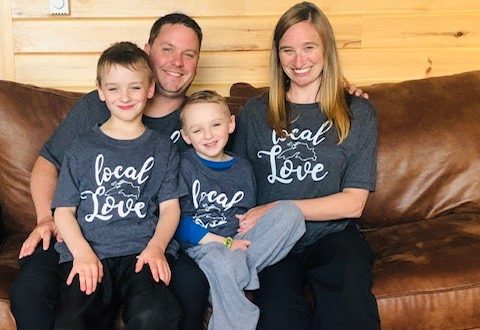Putting social accountability into everyday practice
Posted on January 12, 2021
Dr. Ella Goodman, graduate of the Northern Ontario School of Medicine’s (NOSM) Charter Class of 2011, constantly puts social accountability into practice. For the past nine years she’s provided care to highly vulnerable populations at the Norwest Community Health Centre in the south-east area of Thunder Bay.
“We have a large number of low-income families, unattached patients without family doctors, a large Syrian refugee community, a large urban-Indigenous population and a lot of underserved people in general. We’re always working to better understand everyone’s needs, to better provide health care and access to the health services they deserve,” says Ella.
New virtual care options being offered over the past year helped some patients feel more comfortable accessing services.
“In COVID times, we’re trying as much as possible to keep our services going and to adapt, so we’ve been offering a blend of in-person and virtual appointments. There have been real benefits in accommodating virtual appointments for our clients. Many who work and those with transportation issues, used to struggle with appointment times. Now, they enjoy not having to take time off or take the bus to get here and wait in the crowded waiting room for a ten-minute appointment. Virtual appointments are much more accessible for those who have access to the technology.”
Also, Ella credits the health team at the centre for making unique, thoughtful advances in socially accountable care. “Community health workers here have stepped up with different programming, for example, providing boxes of toiletries, food and common household items to some of our populations that may have a hard time accessing these things during COVID.”
She says her education at NOSM prepared her well for the cultural sensitivities and other realities of practice that exist not only here in one of the most challenged neighbourhoods in Thunder Bay, but in many communities across Ontario.
“There’s definitely a fear that a lot of individuals feel when they have not had equitable care in the past. NOSM prepared me for the realities of trying to break down those barriers and having a strong sense of cultural awareness,” she says. “I try to build an alliance, where the patient feels safe to come and receive care, and a lot of that comes down to meeting the individual where they’re at in their health-care journey. NOSM definitely prepared me for that.”
Ella says NOSM’s focus on culture in education gave her a deeper understanding that culture is unique and helped her apply strategies to deliver better care. She says the nuances of those lessons directly apply to her practice.
“At NOSM, I learned the core concepts of not making assumptions, being open to learning more about a culture, and not being afraid to ask questions. It’s important in practice, and I think it was really helpful to learn early on.”
“I’m always humbled by our patients and always learning in my encounters with them, for example, we didn’t previously have mirrors in our clinical exam rooms and a lot of our patients wear the hijab. It’s helpful to them to have a mirror when putting it on and important because they can’t leave the room without it. Lessons like these are always popping up, and they humble you—I think they require the right approach in asking questions and being willing to learn.”
There are two things that keep Ella going as a busy young physician who is balancing her own young family, and as a hospitalist and preceptor working in a pandemic, “the population we serve, and the wonderfully supportive environment at the centre. I feel like I’m doing meaningful medicine on a daily basis.”
In light of her own lessons learned, she strives to teach NOSM medical students the key values of “just doing the best that we can to help those who we can, and the importance of being able to help provide a safe environment where all individuals can access quality care.”


